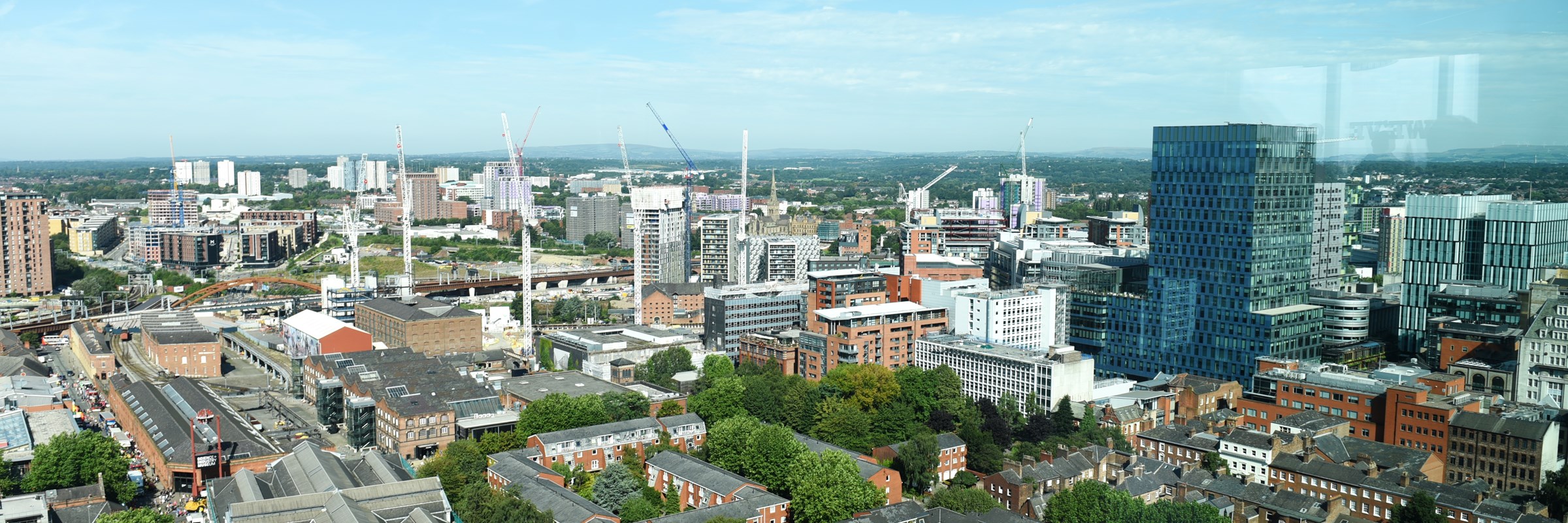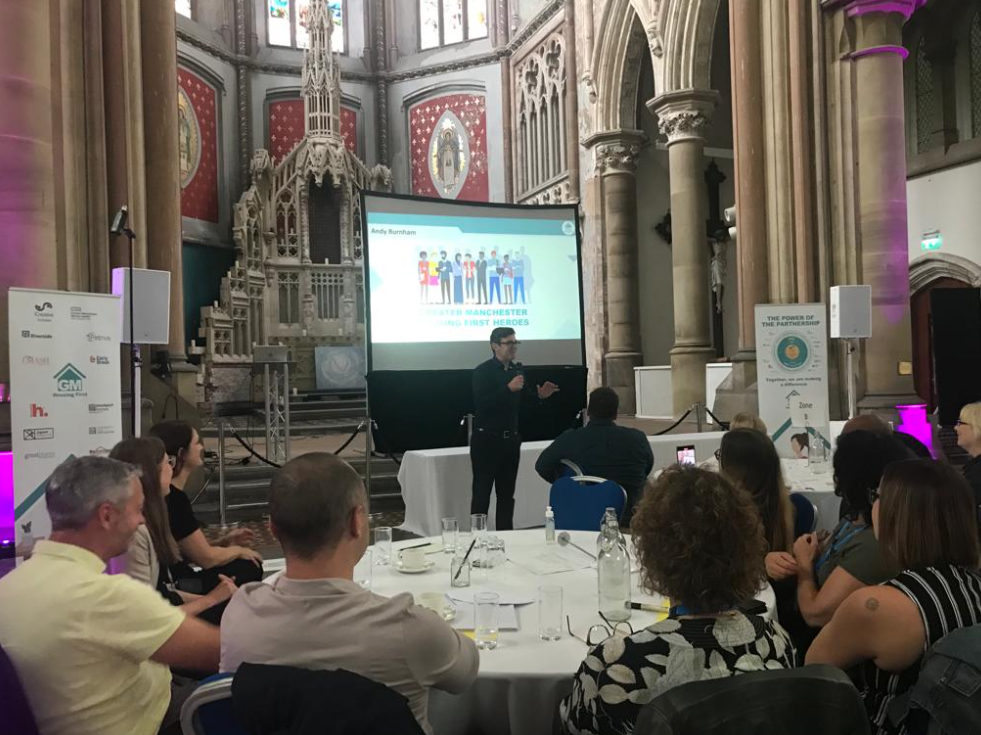
Mayor hails pioneering housing scheme that transformed homelessness response in Greater Manchester
- Greater Manchester’s whole-system approach to homelessness and rough sleeping continues to make an impact across the city-region
- Success of three-year Housing First pilot marked at event in Manchester, after 330 people were supported into their own homes
- Lessons from Housing First continue to inform work throughout Greater Manchester, including in Rough Sleeper Accommodation Programme and Young Person’s Homelessness Prevention Pathfinder
- Latest Greater Manchester count finds 75 people sleeping on the streets, down from 79 in March
A GROUNDBREAKING housing scheme piloted in Greater Manchester has provided homes for more than 300 people with experiences of homelessness, and helped to change the way partners work together across the city-region to end rough sleeping once and for all.
Today (Friday 22 July) Mayor of Greater Manchester Andy Burnham joined staff and delivery partners at Greater Manchester Housing First (GMHF) at an event in Manchester to mark the end of the initial three-year pilot scheme. Set up in 2019, the scheme recognises the importance of housing as a fundamental resource and vital to helping people get back on their feet.
Starting from the principle that people have a right to housing, Housing First uses housing as a platform to enable people with multiple and complex needs to move away from homelessness. The scheme also has at its heart the principle of co-production, where people with lived experience of rough sleeping and homelessness use their insight to help shape the services provided to others.

The Greater Manchester pilot – one of three areas chosen nationally – has supported 330 tenancies for people with entrenched experiences of rough sleeping, achieving an 82 per cent retention rate over the three-year period. GMHF is a partnership between 12 organisations across the city-region, led by the Great Places Housing Group.
Mayor of Greater Manchester Andy Burnham said: “What’s been achieved over the past three years by Greater Manchester’s Housing First partnership is genuinely astounding. Three hundred and thirty people have been given the keys to their own home and personalised support to take back control of their lives.
“All of this springs from one simple principle: that safe and affordable housing ought to be a human right. It’s an ethos that we’ve fully taken on board, and everything we do across our homelessness and rough-sleeping response – from A Bed Every Night, to the Rough Sleeper Accommodation Programme, and other initiatives – is geared towards that person-centred approach, learning from lived experience and offering quality support to get people back on their feet. At a time of extreme cost-of-living pressures, when any one of our residents could be just one run of bad luck away from losing their home, this has never been more important.
“That’s also why it’s crucial that Housing First can continue helping people here in Greater Manchester and across the country, and why its core principle – the right to safe housing – needs to be written into UK law.”
Today’s event also comes as Greater Manchester has recorded a further fall in the number of people sleeping on the streets, based on a single night snapshot in May. Seventy-five people were counted – a figure that, pending verification, indicates another reduction since March, when 79 people were counted.
Greater Manchester Housing First Programme Lead Emily Cole said: “The last three years have been an incredible journey. From setting up the infrastructure from scratch, getting the right partners in place to deliver the service and support people into their own homes – and all in the wake of a global pandemic – the result is truly phenomenal.
“The model puts people in control of their recovery journey and we as a partnership have put people with lived experience at the heart of the programme design with co-production being a fundamental principle of our partnership, which has ensured the delivery of a responsive service to meet peoples ongoing needs and support their recovery.
“The event was a chance to thank the people on the frontline, give them a chance to reflect on everything they have been able to achieve, while looking forward to the next two years as we continue to challenge the system to create meaningful change.
“The partnership has created a wide network of services across Greater Manchester including housing, health and the voluntary sector to name just a few and it’s a credit to everyone who has made the last three years such a success.”
The scheme has also gone on to inform wider approaches to homelessness and rough sleeping across Greater Manchester, including in key components of the Greater Manchester Housing Providers Homelessness Action Plan.
The Rough Sleeper Accommodation Programme (RSAP) in Greater Manchester, a joint effort between local councils, housing providers, and other partners, has successfully secured more funding than any area other outside Greater London. Set up in May 2020 in response to the pandemic, the scheme provides homes and support services to people with experience of rough sleeping. A total of 466 housing units and dedicated support contracts have been delivered at both local and regional level over the past two years.
Greater Manchester is also working with the Greater Manchester Better Outcomes Partnership (GMBOP) to deliver a Young Person’s Homelessness Prevention Pathfinder, which works with 18- to 35-year-olds at imminent risk of homelessness. Adopting a person-centred approach, it provides tailored support to help young people develop new skills, tackle barriers affecting their ability to maintain tenancies, and dedicated support for mental health and wellbeing. Two hundred and forty-five people are currently on the Pathfinder, and the scheme aims to work with more than 1,500 people in the next three years.
Andy Burnham added: “No one should ever have to sleep on our streets at any time of year, and the extreme weather this week has reminded us of the very real risks facing some of the most vulnerable people in society. While we continue to make real progress, we cannot and will not stop until we’ve ended the need for rough sleeping in Greater Manchester.
“The progress we have made up to now has been driven by a clear mission set out five years ago: to build a coalition across the city-region to end homelessness and rough sleeping. The model we’ve built has genuinely transformed the way public services, delivery partners and the voluntary sector respond to these crises, turning a patchwork of different schemes and initiatives into a comprehensive response – from emergency accommodation right through to supported tenancies.
“While we’re proud of what we’ve achieved together, we’re under no illusions about the severity of inflationary pressures and the nationwide chronic shortage of good, affordable and accessible housing to shield people from the worst effects of this crisis. Our Homelessness Prevention Strategy sets out how we will continue the issue throughout Greater Manchester. Now we urgently need the Government to prioritise a response that acknowledges these deep-seated structural problems, and work with us to deliver the investment in the types and tenures of homes that we need.”
In May, Greater Manchester leaders agreed £37.1m in funding commitments to support homelessness and rough sleeping programmes across the city-region, spread across the Community Accommodation Programme, RSAP, Rough Sleeper Initiative, and an expected extension of the Housing First pilot to 2024. This followed the approval earlier in the year of a new £5.85 funding package to support ABEN through to 2025.
As well as attending the Housing First commemoration event today, the Mayor also visited the newly refurbished offices of charity Centrepoint, which provides accommodation and support to 18-25-year-olds, and a new photography exhibition organised by People of the Streets, featuring works by people with lived experience of homelessness – including some who have used the Housing First scheme.
Article Published: 22/07/2022 16:40 PM



